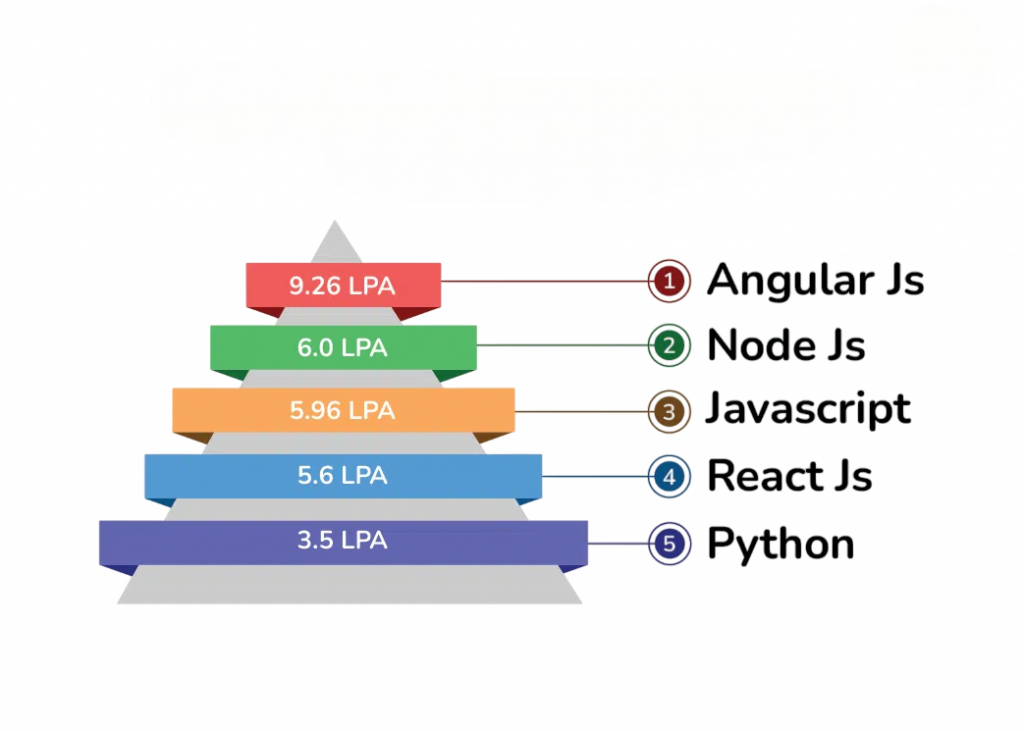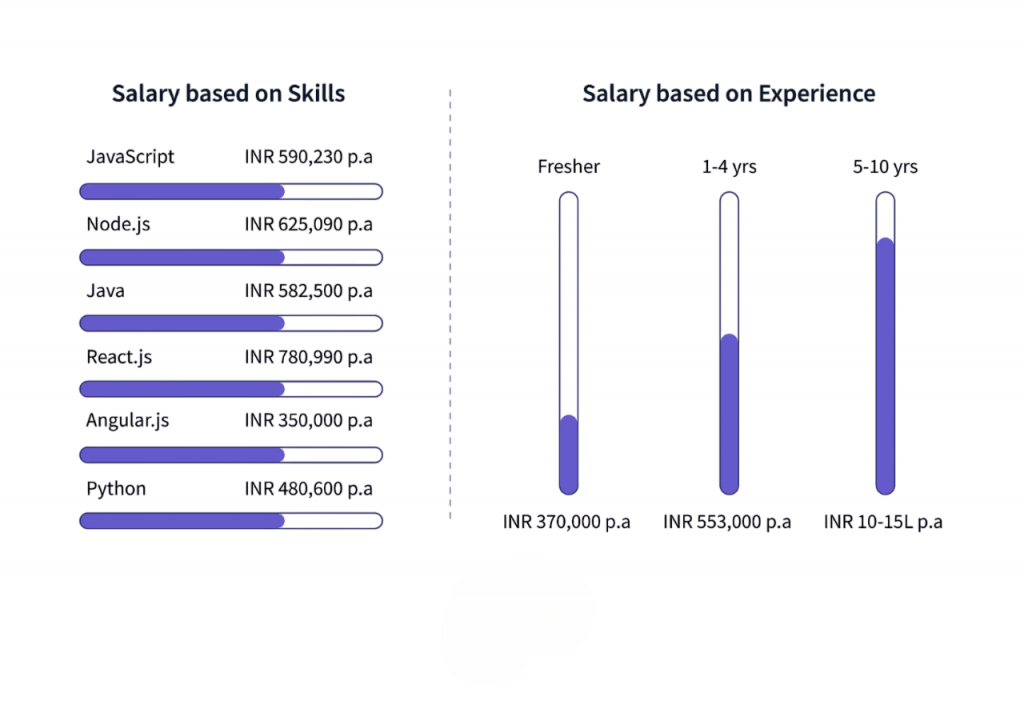
- Web Developer Salary Overview
- Who is a Web Developer?
- Skills Required
- Salary Overview Worldwide
- Salary in the US
- Salary in the UK
- Salary in India
- Salary in Canada & Australia
- Salary by Experience
- Salary by Industry
- Freelance Web Developer Salary
- Conclusion
Web Developer Salary Overview
The demand for web developers has surged significantly in recent years as businesses, organizations, and individuals increasingly rely on websites, applications, and digital platforms to connect with customers. A web developer’s role is critical in designing, coding, and maintaining these platforms, making them central to the digital economy, and Full Stack Training further enhances their ability to manage both front-end and back-end development effectively. With the growing importance of technology and online presence, web development has become one of the most in-demand careers globally. A common question that aspiring developers and professionals ask is: How much does a web developer earn? The answer is not simple, as salaries vary based on location, skills, experience, and industry. In this guide, we will explore the salary landscape of web developers worldwide, including regional comparisons, industry-specific insights, and freelance opportunities, while also discussing the skills that influence earning potential.
Are You Interested in Learning More About Full Stack Developer? Sign Up For Our Full Stack Developer Training Today!
Who is a Web Developer?
A web developer is a professional responsible for building and maintaining websites or web applications. Their work involves writing clean and efficient code, designing user-friendly interfaces, and ensuring that websites are secure, functional, and scalable. Web developers typically fall into three categories:
- Front-End Developers: Focus on the visual aspects of a website, including layout, design, and user interactions, using technologies like HTML, CSS, and JavaScript, while understanding concepts such as Functional Programming vs OOP to enhance coding efficiency and maintainability.
- Back-End Developers: Work on the server-side, handling databases, APIs, and application logic with languages like Python, PHP, Java, or Node.js.
- Full-Stack Developers: Skilled in both front-end and back-end technologies, capable of managing the complete development process.
In addition, some web developers specialize in niche areas such as e-commerce platforms, CMS customization, or mobile-first development. Each specialization influences salary levels, as advanced or in-demand skills often command higher pay.
Skills Required
To excel in web development and secure competitive salaries, professionals must acquire both technical and soft skills.

- Technical Skills:
- Proficiency in programming languages such as JavaScript, HTML5, CSS3, Python, PHP, Ruby, or Java.
- Knowledge of frameworks and libraries like React, Angular, Vue.js, Django, or Laravel.
- Database management skills (MySQL, MongoDB, PostgreSQL).
- Familiarity with version control systems such as Git and GitHub, along with a solid understanding of concepts from Understanding Algorithms , helps developers write efficient and optimized code.
- Experience with responsive design and cross-browser compatibility.
- Understanding of APIs, RESTful services, and cloud integration. Soft Skills:
- Problem-solving and critical thinking.
- Strong communication to collaborate with designers, clients, and teams.
- Adaptability to learn new technologies quickly.
- Time management and organizational skills.
Mastering these skills not only makes a developer more marketable but also directly impacts their salary potential, as employers are willing to pay more for versatile professionals who bring value beyond coding.
Would You Like to Know More About Full Stack Developer? Sign Up For Our Full Stack Developer Training Now!
Salary Overview Worldwide
Globally, the salary of web developers varies widely due to differences in cost of living, demand for technical skills, and maturity of the tech ecosystem. According to international salary reports, the average global salary for web developers ranges between $45,000 and $90,000 per year.
- Entry-level developers (0–2 years of experience) typically earn between $30,000 and $50,000 annually.
- Mid-level developers (3–5 years of experience) can expect salaries ranging from $60,000 to $80,000.
- Senior developers with advanced skills and leadership responsibilities often make between $90,000 and $120,000 annually or even higher.
However, salaries differ significantly by region, with North America, Western Europe, and Australia offering the highest pay, while developing economies provide lower but competitive wages relative to living costs, making Understanding Software Development essential for developers aiming to maximize their global career opportunities.
Salary in the US
The United States is one of the best-paying countries for web developers, given the high demand for tech talent across industries. The average salary for a web developer in the US is around $78,000 per year, though this number can vary depending on skill set and location.
- Entry-Level: $50,000 – $65,000
- Mid-Level: $70,000 – $90,000
- Senior-Level: $100,000 – $130,000+ Location has a huge impact on pay:
- San Francisco & Silicon Valley: $110,000 – $140,000
- New York City: $95,000 – $120,000
- Austin, Texas: $80,000 – $100,000
The tech boom in the US ensures that web developers remain in high demand, with salaries often supplemented by bonuses, stock options, and remote work opportunities.
Salary in the UK
In the United Kingdom, web developers enjoy stable salaries, though they tend to be lower than in the US. The average salary for a web developer in the UK is about £40,000 per year.
- Entry-Level: £25,000 – £30,000
- Mid-Level: £35,000 – £50,000
- Senior-Level: £55,000 – £70,000+
London offers the highest salaries due to its role as a tech and financial hub, where developers often earn 20–30% more than the national average. However, living costs in London are also significantly higher, so regional developers in cities like Manchester, Birmingham, or Leeds may enjoy better work-life balance with moderate salaries.
Salary in India
India is a global IT hub, with a strong demand for web developers across industries, and professionals with Full Stack Training are especially sought after for their versatile skill sets. Salaries in India are lower than in Western countries due to cost-of-living differences but still highly attractive for local standards. The average web developer salary in India is around ₹6–8 lakhs per annum (LPA).
- Entry-Level: ₹3 – 5 LPA
- Mid-Level: ₹6 – 10 LPA
- Senior-Level: ₹12 – 20+ LPA
Top-paying cities include Bengaluru, Hyderabad, and Pune, which are known for their thriving IT industries. Additionally, developers with specialized skills in React, Node.js, or cloud computing earn significantly higher salaries compared to generalists.
Preparing for Full Stack Development Job? Have a Look at Our Blog on Full Stack Development Interview Questions and Answers To Ace Your Interview!
Salary in Canada & Australia
Both Canada and Australia offer lucrative opportunities for web developers, especially as their digital economies continue to expand.
- Canada:
- Average Salary: CAD $70,000 – $90,000 per year
- Entry-Level: CAD $50,000 – $60,000
- Senior-Level: CAD $100,000+ Australia:
- Average Salary: AUD $75,000 – $95,000 per year
- Entry-Level: AUD $55,000 – $65,000
- Senior-Level:AUD $110,000+
- Entry-Level Developers (0–2 years): Primarily involved in basic coding and small projects. Salaries are modest but provide a foundation for growth.
- Mid-Level Developers (3–5 years): Skilled in multiple frameworks, can handle complex projects, and often mentor juniors. Salaries increase significantly.
- Senior Developers (6–10+ years): Experts in design architecture, security, and performance optimization. They often take on managerial or leadership roles, commanding the highest pay.
- Tech & Software Companies: Highest-paying, with salaries ranging from $80,000 to $120,000.
- Finance & Banking: Strong demand for secure web applications, offering above-average salaries.
- E-commerce & Retail: Competitive pay, especially for developers skilled in Shopify, Magento, or custom platforms, while roles like a Game Developer also offer specialized opportunities in the tech industry.
- Healthcare & Education: Growing demand but often lower pay compared to tech and finance.
- Startups: May offer lower base salaries but compensate with equity, bonuses, and flexible work options.
- Beginner Freelancers: $15 – $30 per hour
- Mid-Level Freelancers: $40 – $75 per hour
- Experienced Freelancers: $100+ per hour
Both countries have strong demand for developers in urban hubs such as Toronto, Vancouver, Sydney, and Melbourne. In addition to high salaries, developers in these regions often enjoy benefits such as flexible work arrangements and strong job security, making it important to understand a typical Software Engineer Job Description when pursuing opportunities.
Salary by Experience
Experience plays a major role in determining a web developer’s salary.

In addition to years of experience, building a strong project portfolio, contributing to open-source communities, and obtaining certifications can accelerate salary growth.
Salary by Industry
The industry in which a web developer works also affects salary levels.
Freelance Web Developer Salary
Freelancing has become an attractive option for web developers seeking flexibility and independence. Freelancers can charge hourly rates or project-based fees depending on expertise.
Freelancers working with international clients often earn significantly more than full-time local roles, especially in regions like India or Eastern Europe. However, freelancing also comes with challenges such as inconsistent income, lack of job security, and the need for self-promotion and client acquisition.
Conclusion
Web development continues to be one of the most dynamic and rewarding careers in today’s digital age. Salaries vary widely across countries, industries, and experience levels, but skilled developers with Full Stack Training can expect strong compensation and abundant opportunities worldwide. While the US, UK, Canada, and Australia offer some of the highest salaries, countries like India are becoming competitive, especially for developers with specialized skills. Beyond geographic factors, experience, technical expertise, and industry specialization play major roles in salary determination. The rise of remote work and freelancing has further expanded earning potential, giving developers access to global clients and opportunities. With continuous learning and adaptation to new technologies, web developers can ensure both financial success and long-term career growth.





